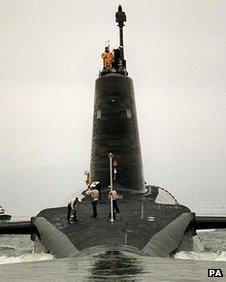Labour 'open' to cheaper Trident alternatives
- Published

The final decision on Trident renewal is due in 2016
Labour says it may rethink its backing for like-for-like replacement of the Trident nuclear weapons system.
The coalition is split on the issue, with the Conservatives backing a straight £20bn replacement of Trident.
The Lib Dems favour a cheaper option, with a study on possible alternatives due to be published in the summer.
Labour says it would consider different options for the future if they provided better value for money while retaining for the UK a "credible" deterrent.
If it did so it would mean a break with past Labour policy - the then Prime Minister Tony Blair committed the party to a like-for-like replacement in 2006.
Trident is a sea-based nuclear weapons system, acquired by the Thatcher government in the early 1980s. It has three parts - submarines, missiles and warheads, and although each component has years of use left, they cannot last indefinitely. The current generation of four submarines would begin to end their working lives some time in the 2020s.
In 2007 MPs backed by 409 to 61 for "conceptual" work to begin on a replacement system, and the go-ahead for the £3bn procurement of important items began after the 2010 election.
But the coalition government also decided to delay the ultimate decision on whether to proceed and how many submarines to order until 2016, after the expected date of the next election.
The Financial Times quotes one of Labour leader Ed Miliband's advisers as saying: "We just want to put it in the bag of money saving measures we are advocating to show we are serious about deficit reductions."
A Labour spokesman told the BBC that the party would look at the outcome of the government's report on possible alternatives to Trident before reaching a decision.
He said the party remained "committed to retaining an independent nuclear deterrent" but would be looking at "value for money" if the report does come up with a viable alternative.
Possible alternatives include ending the requirement to have nuclear weapons on submarines at sea round-the-clock, or using different submarines and cruise missiles.
- Published23 January 2013
- Published27 September 2012
- Published22 September 2012
- Published22 May 2012